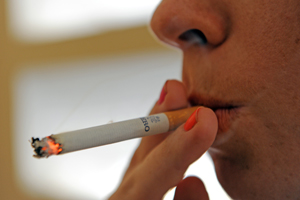Health officials in England have defended a decision to hand over data on National Health Service cancer patients to a US firm linked to tobacco companies, according to a Press Association story.
Public Health England (PHE) said that it handed over the information after the statistical analysis firm William E Wecker submitted a data request under the Freedom of Information Act.
The health body said that it was legally bound to comply. It added that patient data was anonymised.
The comments were made after the Daily Telegraph revealed that data covering 179,040 lung tumours diagnosed between 2009 and 2013 – every case in England over the four-year period – was handed over to the data firm.
In its data request, the firm said it wanted to evaluate lung cancer trends in Australia, Ireland, the UK and the US.
The Press Association said William E Wecker described on its website its association with a number of tobacco companies, including Philip Morris International. But it is linked also to other bodies such as the American Medical Association.
‘William E Wecker Associates has established a track record of creative and effective applications of statistical and mathematical analysis to questions arising in regulation and litigation, in business and government,’ the company stated on its website.
The Press Association story is at: https://www.timesofmalta.com/articles/view/20180115/health-fitness/health-officials-defend-handing-cancer-data-to-tobacco-linked-firm.668048
Category: People

Lung-cancer data released

Qatar has high smoking rate
Hamad Medical Corporation’s (HMC) new Tobacco Control Center in Qatar has been officially inaugurated by the Minister of Public Health Dr. Hanan Mohamed al-Kuwari, according to a story in The Gulf Times.
During the inauguration, al-Kuwari said the new facility would play an important role in the fight ‘to reduce increasing levels of smoking in the community and the long-term harmful effects of smoking’.
“Nothing is more important for the prevention of several cancers and more than 50 other diseases than eliminating the use of tobacco products,” al-Kuwari said.
“The new HMC Tobacco Control Center reinforces our commitment to implementing effective and long-lasting strategies for reducing tobacco use and providing accessible treatment options for people who want to stop smoking. This is especially important in Qatar, where we are seeing more young people smoking and using tobacco products.
“Smoking has been shown to harm nearly every organ of the body and science shows that most adult smokers start smoking during adolescence.”
Meanwhile, Dr. Ahmad al-Mulla, head of the center said that about 37 percent of the country’s population aged 15 years and older reported that they currently smoked tobacco. It was therefore important that efforts were redoubled to reduce levels of smoking in the community.
Fewer smokers in Beijing
There were 3.99 million smokers in Beijing at the end of 2017, 200,000 fewer than there were before the city’s smoking ban came into force eighteen months earlier, according to a Xinhua News Agency story quoting the Municipal Health and Family Planning Commission.
However, the story did not say whether the fall in the incidence of smoking had been caused by the smoking ban; or by other factors, such as price increases.
Beijing implemented what has been described as the ‘strictest smoking ban in history’ on June 1, 2015, prohibiting smoking in indoor public places and workplaces, and on public transportation.
At the same time, medical institutes in Beijing offered smoking cessation services to more than 7.4 million people, while 61 hospitals in the city opened smoking cessation clinics.
In 2017, 95 percent of inspected public places were found to be operating in accordance with the no-smoking regulation, up from 77 percent in the middle of 2015.
Medical institutions, schools and hotels had the best implementation records. Internet cafes and KTVs [karaoke bars] tended to violate the regulation most frequently.
“We will intensify supervision in 2018 and continue to conduct undercover and targeted inspections,” said the Commission’s Liu Zejun. “We also encourage the public to report to us if they see any violation.”
More than 14,800 volunteers were said to have given 77,000 hours of their time to assist in dealing with 4,547 smoking-related complaints in Beijing during 2017.
Argileh crackdown in Jordan
Jordan’s Health Ministry has begun checking that licensed restaurants and cafés are complying with regulations governing the serving of argileh (shisha), according to a story in The Jordan Times.
Under regulations announced in April 2014, restaurants and cafés may serve food but not argileh; they may serve argileh but not food; or they may operate two separate areas, one for serving food and the other for serving argileh.
The regulation bans serving argileh to minors, Health Ministry spokesperson Hatem Azrui was said to have told the Times.
The government, however, granted a period of grace until December 31, 2017, for facilities that weren’t able to meet the requirements immediately.
So the government’s crackdown started on January 1, and any facilities that violate the regulations will be subject to penalties that range between three to six months imprisonment [presumably for the operator of the business] and a fine of no less than JD3,000 and no more than JD6,000. The health minister has the authority to close facilities.
According to the law, smoking is prohibited in hospitals, healthcare centers, schools, cinemas, theatres, libraries, museums, public and non-governmental buildings, public transport vehicles, airports, closed playgrounds, lecture halls and any other location as determined by the health minister.
In principle yes; but…
There are, as a matter of principle, no limits on the number of duty-paid cigarettes a private individual can buy and transport with him when traveling between EU countries, the EU Commission has said in answer to two questions by the Lithuanian member of the European Parliament, Bronis Ropė.
But it perhaps should have added that it would be best for the individual if he traveled with a lawyer.
In a preamble to his questions, Ropė said he had been informed that a Lithuanian citizen traveling in his own car through Germany on August 10, 2017, was asked to pay customs duty on 10 cartons of cigarettes – excisable goods legally acquired in Lithuania that he was carrying in his car.
The driver’s wife and young child were also traveling in the car.
Ropė said the German officers, of the Hauptzollamt Magdeburg customs office, had drawn up report No K1/365/2017.
He then asked the Commission:- Whether the German customs officers were entitled to request payment of customs duty for excisable goods that were legally acquired in the EU and were in transit through the territory of Germany; and
- If so, could the Commission please specify the legal grounds pursuant to which German officers are entitled to request the payment of such duties?
In its reply, the Commission said there were, as a matter of principle, no limits on the number of duty-paid cigarettes a private individual could buy and transport with him when traveling between EU countries.
‘Excise duty is due in the member state of purchase and not in the member state of destination, provided that the cigarettes are for the traveler’s own use and are transported by the traveler.
‘To determine whether these products are for the traveler’s own use, member states have to take all the following factors into account:
* The commercial status of the holder of the products and the reasons for holding them;
* The place where the products are located or, if appropriate, the mode of transport used;
* Any document relating to the products;
* The nature of the products;
* The quantity of the products.
‘With regards the last element, EU legislation provides guide levels (800 cigarettes), which member state authorities may use in certain situations. However, these guide levels are indicative only.’
The Commission said it could not comment on the specific case raised by Ropė.
However, it added, EU citizens had access to the competent national courts if they considered that measures taken were unjustified or infringed EU law.
Another call for shisha ban
The Vision for Alternative Development, the Ghana Non-Communicable Diseases Alliance and other civil society organizations have issued a petition calling on Ghana’s Food and Drugs Authority (FDA) immediately to ban the smoking of shisha in the country, according to a Ghana News Agency story.
The petition said that under the Public Health Act of 2012 (Act 851), specifically part six, (Tobacco Control Measures), shisha must be considered an illicit product that was causing negative health consequences for young people, who were the main targets of shisha.
‘Apart from the known diseases such as heart disease, cancer, respiratory disease and problems during pregnancy, smokers are at high risk of infectious diseases such as TB, Hepatitis, among other diseases,’ the petition said.
The World Health Organization was quoted as saying in a recent advisory note to regulators that smoking shisha posed grave health risks.
The WHO had said it was commonly believed that shisha reduced the risks of smoking because shisha smoke was passed through water.
But the WHO insisted that even after it had been passed through water, the smoke produced contained high levels of toxic compounds, including carbon monoxide, heavy metals and cancer-causing chemicals.
The petition said it was believed that the import of shisha products was illegal.
It said all tobacco products must be registered with the FDA before they were allowed entry into the country.
It said shisha products were being imported from neighboring countries through unapproved routes. Some of these products displayed no country of origin and it was not known what their constituents were.
Any product, including tobacco, that did not display its country of origin was illicit, therefore shisha was an illicit product and must be immediately banned, the petitioners said.
Tobacco season delayed
Zimbabwe’s Tobacco Industry and Marketing Board (TIMB) says that the opening of the 2018 flue-cured tobacco selling season is likely to be delayed because of the late onset of rains, according to a story in The Chronicle.
Most of the crop is still in the fields whereas, usually at this time of the year, most growers would be harvesting and curing their crop ahead of the start of the selling season in mid-February or early March.
Last year, the marketing season opened on March 15.
No date has been set for this year’s opening of sales, some of which could be held outside Harare – in Rusape, Mvurwi and Karoi.
Tobacco is one of Zimbabwe’s major foreign currency earners that last year generated $904 million in exports, down from $933 million in 2016.
The Confederation of Zimbabwe Industries (CZI) has recognized the tobacco selling season as a period when the country’s liquidity situation improves, allowing manufacturers to access foreign currency with which to import critical raw materials.
Self-censorship suggested
Cigarettes are ‘ubiquitous’ in films and on television, and this is a problem, said Marlene Mortler, Germany’s Federal Drugs Commissioner, in an interview with newspaper and magazine publisher Funke Mediengruppe that was reported by DW World (Deutsche Welle).
“The more frequently that young people see others smoking in films and on television, the greater the likelihood is that they will pick up a cigarette,” said Mortler, referencing a recent study by the Kiel-based Institute for Therapy and Health Research.
That study revealed that of the 39 films which were nominated for the German Film Prize in 2016 and 2017, smoking was shown in 33 of them. In films nominated for an Oscar during the same period, that ratio was 64 percent.
Mortler hopes to make people working within the film industry “more aware of their role in influencing the health of their viewing public”.
DW World said that because film characters were often looked up to by viewers, ‘children and young adults may be more likely to smoke after seeing one of their heroes light up on screen’.
According to the DW World piece, Mortler seemed to be saying that because the number of people who smoked in Germany was steadily declining, especially among those aged 18 to 25, the light in which smoking was presented in films should be made less positive.
“The idea that audiences have this kind of media literacy is reckless and short-sighted,” Mortler was quoted as saying in her ‘appeal to the film industry to be more sensitive in their presentation of cigarettes’.
One cigarette is enough
At least 61 percent of people who smoke one cigarette become, at least temporarily, daily smokers, according to a sciencedaily.com story citing an analysis of survey data by researchers at Queen Mary University (QMU) of London, UK.
The findings from more than 215,000 survey respondents, which were published in the journal Nicotine and Tobacco Research, are said to provide strong support for prioritising efforts to reduce cigarette experimentation among adolescents.
“This is the first time that the remarkable hold that cigarettes can establish after a single experience has been documented from such a large set of data,” said lead researcher Professor Peter Hajek of QMU.
“In the development of any addictive behaviour, the move from experimentation to daily practice is an important landmark, as it implies that a recreational activity is turning into a compulsive need.
“We’ve found that the conversion rate from ‘first time smoker’ to ‘daily smoker’ is surprisingly high, which helps confirm the importance of preventing cigarette experimentation in the first place.
“The UK is seeing a dramatic reduction in smoking at the moment and this tallies with recent findings that only 19 percent of 11-15-year-olds have ever tried a cigarette, so the good news is that we are on the right track.”
Smoking creates poverty
Cigarette consumption is the second largest contributor to poverty in Indonesia, after rice consumption, according to a story in The Jakarta Post citing a National Development Planning Board (Bappenas) statement on Tuesday.
“People shouldn’t be dependent on such an unproductive habit,” Bappenas head and National Development Planning Minister Bambang Brodjonegoro was quoted as saying by tribunnews.com.
Bambang called on the people to stop the bad habit and start spending on more important commodities, such as meat, so they could provide their families with more nutritious meals.
He said the government would never support a decrease in cigarette prices; instead, it would increase prices by imposing a higher excise duty on cigarettes.
“As of September 2017, cigarette consumption contributed 9.98 percent to the poverty rate in urban areas and 10.70 percent in rural areas,” Bambang said.
The contribution of cigarette consumption to the poverty rate was said to have peaked in 2014 at 11.18 percent.









